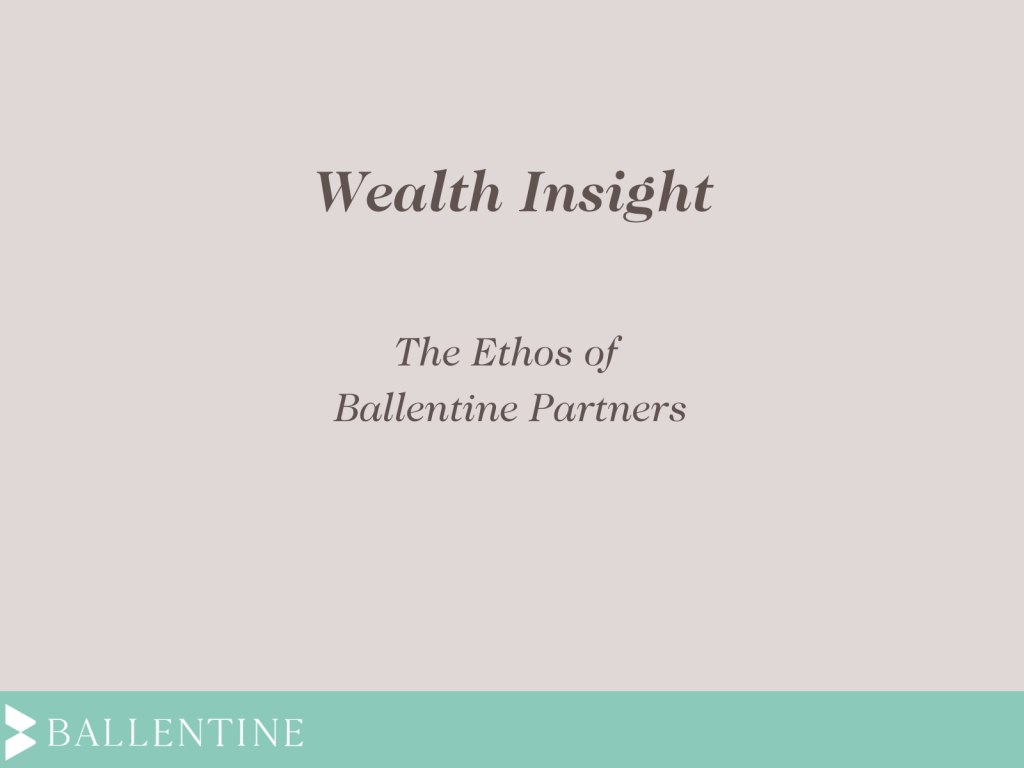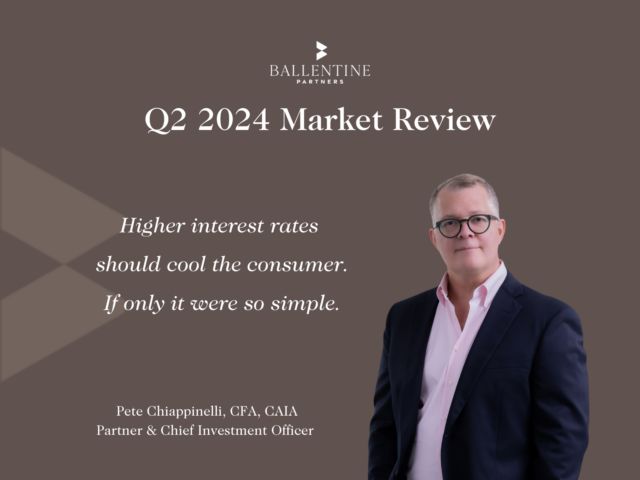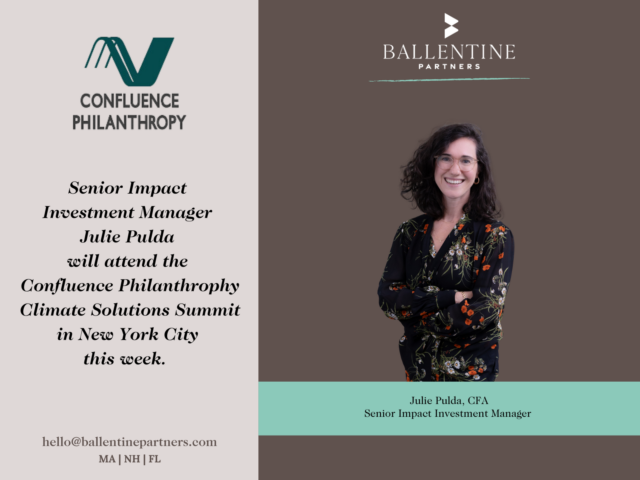What does Ballentine Partners stand for? What are its core values? Why do those values matter? What do I hope our company aspires to become? As the founder of our firm this is a good time for me to write about those questions, now that leadership of the company is well-established in the hands of carefully selected long-time members of our team.
Ballentine Partners traces its roots to 1984. At its inception, certain values were foremost in my mind. Those values have shaped our firm’s culture. Many of our team members were attracted to Ballentine Partners in large part because of our values. Those values are just as important and relevant today as they were in 1984. It is my hope that as Ballentine Partners grows, we will continue to adhere to the values described here.
1. Fiduciary
We serve our clients as a fiduciary. That means we serve our clients by putting their interests ahead of our own. We behave with integrity. We are careful. We keep our promises. We are responsive. We operate within our sphere of competence. We respect the confidentiality of non-public information entrusted to our care.
2. Client-centered
Long ago a wise person said to me: “Clients don’t care what you know until you show how much you care.” I believe that is absolutely true. We must continue to show our clients how much we care about their well-being and what a privilege it is to be of service to them.
Every major decision should be examined from the perspective of a key question: “How will this change or new idea benefit our clients?” If a change or new approach is going to be harmful to clients in some way, then in the long run it is not good for our firm. Here is another useful test to employ when making major decisions: “If our clients were here in the room with us listening to this discussion, what decision would they want us to make?”
So far, we have chosen to decline all opportunities to be acquired, to merge, or to acquire other firms. We have focused on serving our clients rather than pursuing growth for growth’s sake. We know of many firms that saw their cultures destroyed as a result of being acquired or merging with another firm. We value our client-centric culture, and we don’t want that to happen to us.
3. Conflicts of interest
We must continue to minimize conflicts of interest between ourselves and our clients, and to provide clients with objective advice. One of our company’s founding principles is that our income would be derived from fees paid to us directly by clients in a fully disclosed manner. We decline all third-party payments that create conflicts of interest, such as referral fees, finders fees, soft dollars, order flow payments, commissions, and fee-sharing arrangements. Unfortunately, those types of conflicted compensation arrangements are commonplace among wealth management firms.
4. How we give advice
Since the very first day of the company’s existence, our value proposition is that we provide families with advice about a broad array of wealth management issues – not just investment advice. We put a highly trained financial planning professional in charge of every client engagement. That makes a world of difference in terms of the quality of advice our clients receive, and our ability to help clients identify opportunities and avoid mistakes.
We have tightly integrated our financial planners and investment professionals. The result is that we are able to deliver great wealth management advice and great investment advice. That is why so many of our clients who have had wealth management experience elsewhere wind up saying to us, “We had no idea what we were missing!”
5. Our reputation
Our reputation is our most valuable asset. We have spent decades building an excellent reputation as a firm – as a great advisor and as a great place to work. We must carefully protect and nurture that reputation every day. A single careless or thoughtless act by a member of our team could seriously damage or destroy it.
6. Respect for individuals
We strive to treat all individuals with respect, both inside our firm and outside. “Do unto others as you would have them do unto you.” We need to be particularly thoughtful about this issue when we discover an error made by another professional. We should give that professional an opportunity to deal with the problem first before calling the matter to the attention of the client, provided that it is not likely to cause the client any harm.
7. Inclusivity
We have always had an inclusive culture, and I hope it can become even more inclusive in the future. The leadership of firms in our industry is dominated by males. In contrast, we have a substantial number of women in leadership positions. How can we recruit more people of color and prepare ourselves to serve more clients of color?
8. Service to others
Many of our team members are involved in activities outside of work in service to others, to improve the quality of life for those less fortunate than ourselves, and to work on constructive solutions to problems facing our society. I hope we will continue to encourage and support those types of activities.
9. Our culture
Our “corporate culture” is defined by the system of values, beliefs, and norms that govern the behavior of our team members when they interact with each other, our clients, and other advisors. Another definition is that our “culture” determines how team members behave when they know they are free of immediate oversight or supervision as they confront an opportunity or problem.
For example, if I discover I made a mistake that harmed a client and no one else knows about it, do I cover it up – or do I confess it and expose myself to whatever consequences may follow from doing that? Our value system says that covering up a mistake is inconsistent with fiduciary behavior and will not be tolerated. An important feature of our culture is that we encourage the right behaviors by supporting team members who make the right decisions in the aftermath of a mistake.
10. Leadership
In his book, Good To Great, Jim Collins describes the attributes of a Level 5 leader. Two of the key attributes are: (1) a leader who channels ambition into building a great company rather than self-aggrandizement, and (2) setting up successors for even greater success in the next generation of leaders.
In many respects, the future of Ballentine Partners will depend upon our values, mission, leadership and congruence. The concept of congruence addresses the question: In what ways does the leadership of an organization behave in a manner that is demonstrably consistent (i.e. congruent) with the values and mission they espouse? When leaders’ behavior is congruent with mission and values, things tend to go well. When leaders’ behavior is inconsistent with mission and values, then the organization develops rot at the core and its performance suffers.
We must remain true to our values. I believe the company is well-positioned to continue to be a values-based, mission-driven organization led by individuals who already exhibit traits of Level 5 leadership and aspire to become even better Level 5 leaders. Level 5 leaders are always seeking to improve!
To learn more about Roy C. Ballentine, ChFC, CFP®, click here.
This report is the confidential work product of Ballentine Partners. Unauthorized distribution of this material is strictly prohibited. The information in this report is deemed to be reliable but has not been independently verified. Some of the conclusions in this report are intended to be generalizations. The specific circumstances of an individual’s situation may require advice that is different from that reflected in this report. Furthermore, the advice reflected in this report is based on our opinion, and our opinion may change as new information becomes available. Nothing in this presentation should be construed as an offer to sell or a solicitation of an offer to buy any securities. You should read the prospectus or offering memo before making any investment. You are solely responsible for any decision to invest in a private offering. The investment recommendations contained in this document may not prove to be profitable, and the actual performance of any investment may not be as favorable as the expectations that are expressed in this document. There is no guarantee that the past performance of any investment will continue in the future.




